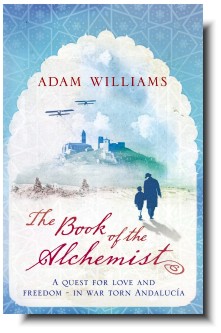A brilliant morality tale which weaves effortlessly between the bitter and brutal Spanish Civil War and the exotic and dangerous world of medieval Andalucia.
The Book of the Alchemist is a gripping Scheherazade-style journey of discovery through the cynical cruelties of civil war, the horrors of religious intolerance and the uncompromising nature of rigid political ideology. It is also a cleverly crafted parallel tale of the healing power of love and redemption, and the courage and determination that spring from an unquenchable spirit of optimism.
A thrilling and yet thought-provoking read…
Pam Norfolk, Lancashire Evening Post
***
This is an engrossing adventure story, dealing with the themes of religion and idealism, that captures the imagination from page one. … a plot that’s dripping with historical detail, Williams succeeds in keeping the novel both interesting and relevant – the perfect book for curling up with at the weekend.
SHE magazine
Order ‘The Book of the Alchemist’ from Amazon.co.uk
It’s 1938 and Professor Enrique de los Reyos Pinzon is in the wrong place at the wrong time. He and his young grandson Tomas have been taken hostage by a ruthless band of communists and the threat of annihilation hovers over them like a dark shadow. Pinzon is no stranger to death and tragedy; his son has already been killed and his daughter-in-law has simply disappeared. The civil war has been a rude awakening for him…He was a highly-respected professor of medieval studies, an important man in the government and prided himself on his egalitarian and socialist outlook. But serving his country as a good libertarian is one thing – being ground to nothing by Stalin’s Soviets and their totalitarian machine is quite another. Atrocities are now committed ‘for necessity’ and when Pinzon, Tomas and a group of other innocents are herded into the magnificent early Christian cathedral of Ciudadela del Santo, he learns that they are to be blown up in one last desperate act of destruction. Under orders to help lay explosives in the crypt, Pinzon discovers that under the cathedral is a perfectly preserved Moorish mosque containing a statue of its ancient architect and a leather-bound book which tells the story of its creation. And between its covers lies the hitherto undiscovered story of an incredible friendship between three boys – a Jew, a Muslim and a Christian – who grew up to be an alchemist, a prince and a mason. It was written 1,000 years ago by Samuel, a Jew, a physician and alchemist, whose burning desire was to see his ideas of beauty in all things – light in dark, good in evil and heat in cold – survive for future generations. And as his words transport Pinzon and his fellow hostages back to Al-Andaluz in 1063, a time when Moorish tolerance was about to be swept away by the forces of war, pogroms, butchery and civil war, he realises that the lessons of yesterday might also hold the key to their escape…
Watch promotional video below or click here.
The possibility of harmony between people of different backgrounds and beliefs is presented as a flickering ideal in this historical novel set in the 11th and 20th centuries. In 1938 a hostage held by a reckless revolutionary group discovers an ancient book written by Samuel, a medieval alchemist. Samuel’s erudite and idiosyncratic writing about friendship, creativity and war has an extraordinary relevance to the hostage’s situation. This carefully researched novel quickens in pace and interest as it proceeds. It also offers worthwhile insights into love and idealism in all periods of history.
The Sunday Canberra Times***
Rewarding novel of love and friendship connecting worlds a thousand years apart
The Sun***
Imagine the Arabian Nights transposed to the Spanish Civil War, or rather the narrator transposed to Andalusia in 1938, for like Scheherazade the narrator of The Book of the Alchemist is telling stories of long ago. Also, like Scheherazade, the narrator is a prisoner telling the stories in a bid to survive.
This then is a story within a story, each with its own narrator, switching alternately from the 20th and the 11th century. The 20th-century framework concerns a Republican politician held hostage by a band of Communist guerrillas besieged in a cathedral by the Francoist army. He discovers an Arab manuscript in the crypt which narrates the adventures of three men, a Moslem, a Christian and a Jew, in Mediaeval Andalusia and in reading the stories to his fellow prisoners he finds the means to escape.
This is also a moral tale, contrasting the enlightened tolerance of Arab Spain with the murderous bigotry of the 1930s. Both the Arab story and the Civil War story in which it is embedded are ultimately tragedies, although in both tales enough of the protagonists survive to keep the flame of hope alive.
The Arab story takes up the larger part of the book, told from the viewpoint of a small Moorish principality assailed by both Christian crusaders and Berber fanatics. It has all the feel of court, military and harem life that pervades the Arabian Nights, and as with Scheherazade we have to stretch our credulity at times. If you enjoyed the Arabian Nights you should enjoy this.
Edward James – Editor’s Choice, Historical Novels Review, November 2009


